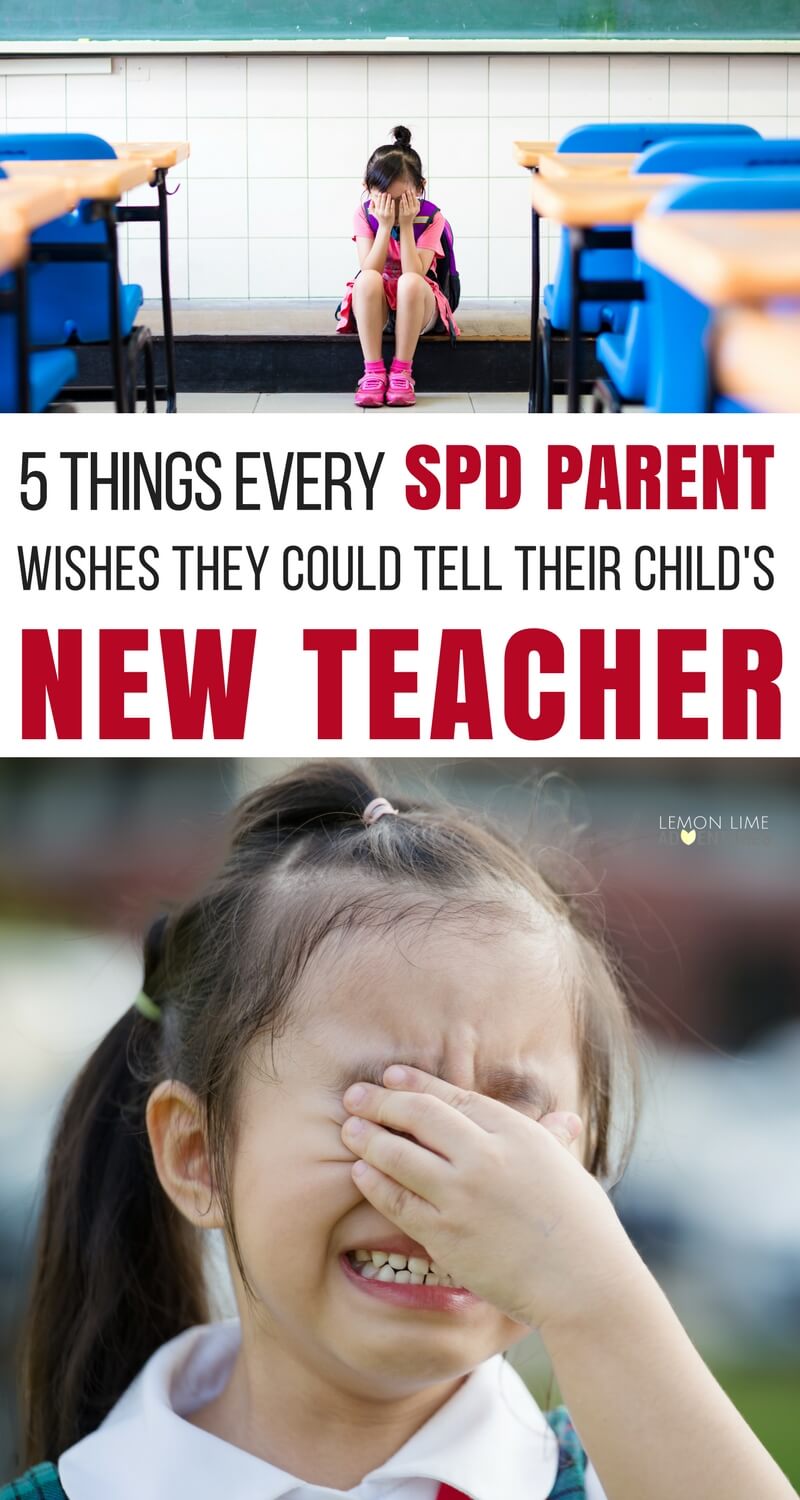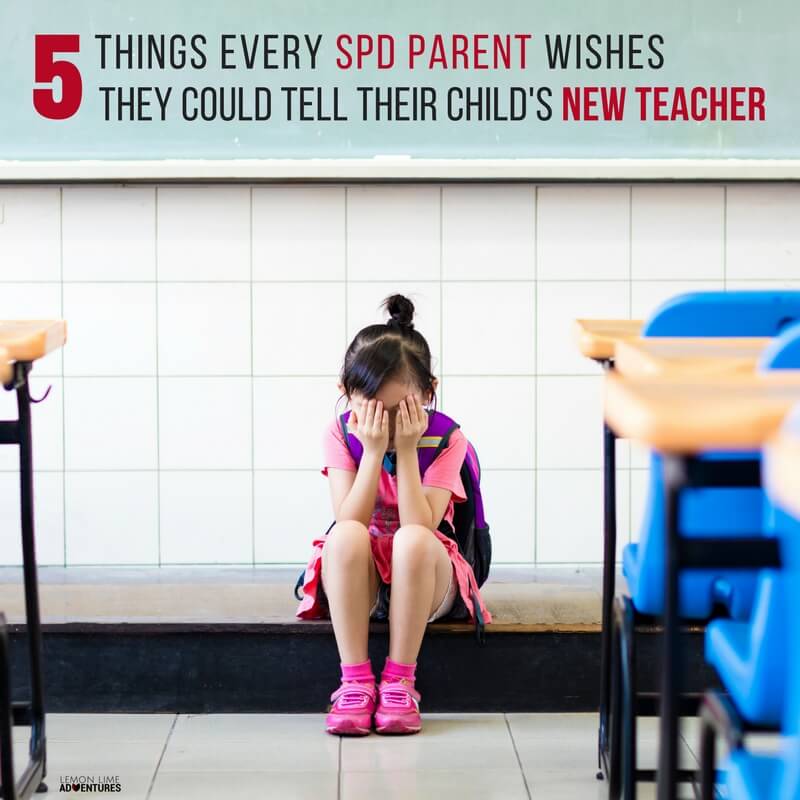At the start of every school year, I can literally feel my stomach move slowly from the depths of my belly to my chest and up into my throat.
I can’t help but think of every possible scenario as my sensory kiddo heads into a new school year with a new teacher and new friends.
How many days will it be before the principal calls me?
What will be the first thing he does that gets him in trouble?
Will this teacher understand him, or label him as the “bad kid” like all the ones before?
What if he has a meltdown in the middle of class?
What will his friends think?
How will he handle it?
Will it completely crush his spirit?
The beginning of the year is such a busy time for us parents, our kids, and our schedules. But I know its even busier for the teacher. Sometimes they have up to 30 kids that they have to get to know and understand in such a short amount of time. I wish I could sit down for hours talking to my kid’s new teacher about him and how to help him be successful.
Since I know that’s not really gonna happen, I’ve gathered together parents just like me.
Parents who have sensory kids that are constantly misunderstood.
Today we want to share what we wish we could pull the teacher aside and say at the beginning of the year.

Before we begin, we need to tell you something extremely important:
Thank you.
Thank you in advance for your patience, expertise, and understanding.
Our children do not fit in a nice, pretty box. They might test what you already know and push you to learn things you’ve never imagined. So thank you.
You spend more time with our children than we do, and yet we know that you have 28 other children to take care of and love and nurture and grow.
We know our child’s not the only child you have. But we also know that to our child, you are a goddess.
At the start of the year, you have an opportunity to be the one person, one person that makes a difference in our child’s life.
We say these things in this list not to berate you or judge you or to assume you don’t know what you’re doing.
In fact, it’s quite the opposite.
We think you are amazing.
We know that you are pushed and pulled in many directions. We understand you were probably never taught how to handle a child like ours.
We ask only one thing from you:
We simply ask that you trust us.
Collectively, we have read hundreds, if not thousands, of books.
We have clocked thousands of hours in therapist offices, doctor’s appointments, and evaluations.
We have watched our children like hawks, learning their ins, their outs, their triggers.
So much so that as a collective group, we have learned how to help others who are struggling like we once were.
We don’t want this year to be another year of battles and struggles and fights and arguments.
We want this to be THE year.
We want this to be the year our child comes home and says, “I love school.”
We want this to be the year that our child comes home and says, “I have made a friend.”
We want this to be the year that our kid finally gets it and says out loud, “I am enough.”
This is why we ask you to put a tiny bit of trust in us as we share a few thing we might not be able to say to your face as start the year.
If you take these few things to heart, I am pretty sure you are gonna give our kid that year.

1. My child is not bad.
He is not broken.
He is not naughty.
She is not giving you a hard time.
He is not spoiled.
She is not disrespectful or rude.
Instead, it’s quite the opposite.
My child is having a hard time, struggling to communicate, grasping at self-regulation, and quite possibly overwhelmed by everything going on around them.
Related: A Letter to the Teacher from the “Bad” Kid

2. My child requires a lot of patience.
As a public school teacher for over 15 years, I already know that you have more patience in your pinky finger than the combined patience of an entire army of generals, and yet my child is going to require even more patience, more waiting, more chances, more openness, more understanding.
Plain and simple, more.
We hate to ask you for more and more and more, knowing how much you’re already being asked of.
But if we could ask for one thing, we would ask you to give our child more patience so that it gives you the time to understand why our child is doing exactly what they’re doing.
Related: 100 Calm Down Strategies You Can Use Today

3. Please don’t blame us.
We know you only see what goes on at school.
It’s easy for you to think that this must be because we did not teach our children correctly, we said “yes” way too often, or we didn’t set the right boundaries.
But after six years in the trenches with these parents, I can tell you we are trying so hard.
In fact, we have other children that thrive in school.
We have been told for years that it’s our parenting, that it’s our fault, that we did this to our children. When that thought creeps into your head, or when administration wants you to think that it is because we aren’t doing enough at home, we need you to stand up for us.
We need you to believe us. We need you to join with us so that we can figure out what we’re doing at home that is successful, that can carry over to classroom or vice versa.
Related: 10 Things To Never Say to Parents of a Child with Sensory Processing Disorder

4. We need you to think outside the box.
Yes, we know that our child is touching everyone, interrupting, can’t sit still, and is constantly in someone else’s space.
We need you to push your notion and ideas of behavior management to try new things, to see our child’s behavior as a cry for help. We need you to be open to trying things even if they sound absolutely ridiculous.
I’ll never forget the first time a parent came into my room with a blanket and a vest that weighed more than my backpack.
She asked me to wrap her son up as tightly as can be and squeeze his arms if he starts to get overwhelmed. This was before I knew anything about sensory processing disorder. I could have told her, “This is wackadoodles and there’s no way I’m doing this.”
But instead, I was flexible.
I thought outside the box and I tried it.
Once I did, it opened up a whole new world of strategies and solutions to help not only that kid in my class, but all the others that were struggling and getting overwhelmed. This might mean that you need to rethink consequences and punishments.
In the past…
- you might have taken away recess, but please, for the love of God, do not take recess away from our children.
- you might have just talked louder and repeated yourself. But I can assure you, this is one of the fastest ways to get our children to shut down and refuse anything you ask them to do.
- you might have asked them to be good or make good choices. But unfortunately, all that does for our children is instill a value that they are bad, that they are wrong, and that they cannot be good enough.
Related: Simple Sensory Breaks For Home and the Classroom

5. Finally, we need you to see our children.
This is a big one.
- We need you to look past their rough exterior, see beyond their big meltdowns and behaviors, understand that there is so much more beyond the child that is sending you home with headaches and an increased need for coffee and wine.
- We need you to look past all of that and see the child that we see.
- We need you to see their strengths, their unique likes and dislikes, their abilities, their awesomeness.
- We need you to praise them and give them positive interactions.
- We need you to love them, because I can assure you, if you can do these few things, you are going to be the difference in this child’s life.
We know that you went into teaching to make a difference.
Our child is that difference.
PS: We know this won’t be easy.
We know that you are gonna need an influx of chocolate and headache medicine and coffee and wine. We get that and understand it.
Just let us know when your supply is running low and we would be happy to stock that survival kit for you. The truth is we’re in this together.
We love you, adore you, trust you, and now we are ready to join forces with you so that our kid can have the best year that they’ve ever had.
Signed,
Every parent who’s child struggles with SPD

What do you wish you could tell your child’s new teacher this year? Let me know in the comments below or on Facebook!
*****************************************************
Thanks for being part of the Lemon Lime Adventures community. For those of you that are new here, I want you to know you are not alone. Loving children that don’t fit in a nice pretty box comes with ups and downs, twists and turns, but together… we’ve got this. I invite you to join me on Facebook or in the Superkids Movement, where we are challenging ourselves to see our children’s behaviors as a cry for help and we are building a toolbox and language to build them up and create a lasting relationship. In my new best-selling book, The Superkids Activity Guide to Conquering Every Day, I have created a toolbox written for you and your child to change their inner language and the way the world sees our children.
More Resources For Dealing with Sensory “Issues”
To help you remember some of these strategies and understand sensory behavior and what to do in the moment, I’ve put together this amazing poster set on how to understand your child’s sensory struggles and discipline sensory meltdowns.
These posters give you tips on how to help your child regulate their sensory needs, and identify what your child’s behavior is really telling you!
There’s also a list of 7 common myths about sensory behavior. I dispel these misconceptions so you can gain a deeper understanding of what sensory really is.
Ok, you might be thinking…
This all sounds great but…
- What should I do when my child is having a meltdown?
- How do I create sensory strategies that are going to help my unique child?
And, - How exactly do I get them to use those strategies in the moment?
In my next blog post, I’ll share how to create sensory tools that are going to help your specific child. I’ll also tell you what to do in the moment when your child is in sensory overload and having a meltdown!
But right now, download your FREE Handle Any Sensory Challenge posters so you can get a deeper understanding of sensory and start implementing some sensory activities and routines with your family!






OMG, I want to send this link to ours teachers… Yesterday he was sent to seat and wait while all other kids were excersicing… No right….
This is great information, and I hope that it helps a lot of kids. I am an adult with sensory processing disorder. I’ve had it all my life but wasn’t diagnosed until I was 40. The memories of my struggles in school as a kid have never left me. I remember how painful my ears felt from the feedback of the loudspeaker. The voices felt like shards of broken glass. I remember the teacher saying lots of words and asking questions but I didn’t understand the question because it was no louder than the noises from outside. Thank you for writing this piece and I hope that it helps some of the kids who are experiencing what I did.
Hi Dear, I have just found out your site and cried after reading this article of yours because it is exactly what goes on inside my mind. Thank you so much for publishing about SPD! Best regards, Andrea.
Pingback: have a good day alternative
Thank you for writing this. I am a mother of two and a second grade teacher. I currently have a student in my class who is off the charts out of control and unsafe to others and himself, at some points and at other time is able t show what really great kid he can be. Unfortunately we are just beginning to process of professional evaluations and assessments so it’s looking like it will be a while before we get any professional feedback and suggestions. Reading this article has opened my eyes and I am now going to do some more research. I am not a doctor so I can’t diagnose the student in my class, but SPD seems to fit well. If you have any ideas or suggestions or can even recommend any valuable resources that could help me better manage in the class until there is an official diagnoses I would really love to try it. We have already tried a lot of the typical ADD/ADHD, ODD and Autism tricks and tools. Unfortunately not much has worked. I am hoping that some of the strategies to help students with SDP might work for my student.
I have a kiddo that is been diagnosed with SPD and ADD. He has struggled for years in school. Now that we’re dealing with COVID he is doing all of his work virtually and that has been a disaster. I have begged my son’s teachers to help me to help him but I still can not get the on the same page. I think implemented quite a few of your suggestions and will try some of the ones we haven’t. I experience frequent anxiety attacks because nothing I seem to be found seems to help. Does anyone have any suggestions on how to get teachers to understand and to help us and him.
Everything I have been feeling is nicely packaged here. Thank you!!! I have felt like I have been on an island alone. The frustration, hurt and helplessness has been ruling my world for the past two years. This year has been different and finding articles like this gives me so much comfort.